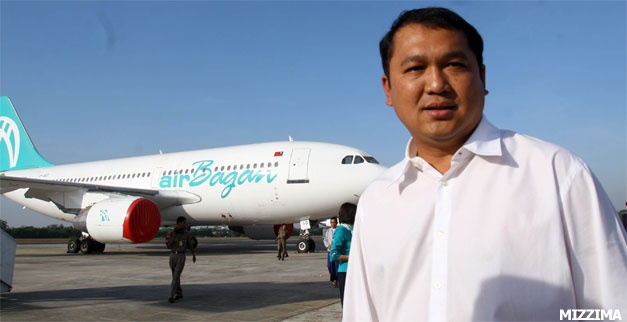(Business) – In a rare interview published in ‘The Future’ magazine in Rangoon, Burmese business tycoon Tay Za called the Western economic sanctions on Burma ‘obviously unfair’.
The close business associate of key junta generals said he thought it was unfair that while the US and EU sanctions remain in place against Burma, ‘No action has been taken against Chevron company of the US and Total company of France, which are reaping billions of US dollars annually from their natural gas projects in Myanmar’.

The 46-year-old billionaire who enjoys close relations with the ruling generals is also president of the Myanmar Gems and Jewelry Entrepreneurs’ Association. He downplayed the affect of gem sanctions, and said China more than made up for the lack of Western foreign investment, particularly in the jade market in which he is a major investor.
‘The sanctions have had no impact particularly because the jade market is much liked by China and also because the Chinese economy is growing so fast’, he said.
There are loopholes in the gem sanctions as they affect the jade market, he said. ‘Despite the sanctions that are imposed by the US and European politicians, business people from the West are still buying our gems’, he claimed.
Tay Za is on the sanctions lists of American, European, Canadian, Australian and Swiss governments. Sanctions are also imposed on his wife, Thidar Zaw, and his son, Pye Phyo Tay.
His business ventures include gems and jade, an airline, hotels and tourism, agriculture, construction and timber exports. His major company, Htoo Trading, is also Burma’s leading teak exporter and his close association with the military elite has led to agreements to access some of Burma’s most pristine forests.
In the interview, Tay Za said he had taken his father’s advice and invested in Burma in order to create jobs for Burmese people. He encouraged young Burmese abroad to ‘come back home and work here’, noting, ‘There are lots of opportunities here these days’.
He told The Future that he started out in business in 1984 with less than US $12 and in 1995, he achieved millionaire status. He is now regarded as the richest man in Burma, although some claim his influence within the regime is somewhat exaggerated and that there are other lesser-known businessmen who act as crucial business connections to the generals.
The Future reported that the jade market in Burma is booming. Jade sales have nearly doubled every year since the 2008-09 fiscal year, it reported. In the 2008-09 fiscal year, jade sales earned $436 million and by the end of the 2009-10 year that figure more than doubled to $953 million before hitting $1.75 billion this financial year.
According to a Myanmar Times article published last month, during the 48th Gems Emporium held in Naypyitaw in March, jade traders began pricing jade in euros. Kyaw Kyaw Hein, a representative for the Thida Mya Nan jade company in Rangoon, told the Myanmar Times that the pricing of jade lots in euros was a government initiative.
Most domestic gem and jade companies encounter payment difficulties when negotiating bank transfers with international buyers because of Burma’s unsophisticated banking system.
“Most of our sales are on credit because almost all foreign customers refuse to bring in large amounts of cash with them…Our banking system makes it very difficult for those buyers to transfer money into our accounts’, he told the Rangoon-based paper.
In the interview, Tay Za downplayed the Western sanctions and pushed the role of Burma’s connection with Asian countries. ‘We are making use of more and more Asian products’, he said.
The Western sanctions on the gems business and on the hotel and tourist industries shows an ‘immoral’ attitude on the part of the US and European countries towards the people of Burma, he said.


